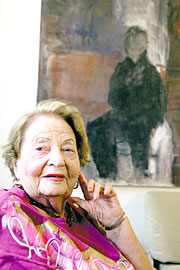Sara Zarkin-Epstein
 Sara Zarkin-Epstein is a graduate of three clandestine wars. The first was to save Jews from the Kovna Ghetto in Lithuania during the Second World War, the second was vengeance by Jewish survivors on Nazi criminals, and the third was part of Zionist activity to bring illegal immigrants to Palestine before the establishment of the State of Israel. Then came the long years in Siberia.
Sara Zarkin-Epstein is a graduate of three clandestine wars. The first was to save Jews from the Kovna Ghetto in Lithuania during the Second World War, the second was vengeance by Jewish survivors on Nazi criminals, and the third was part of Zionist activity to bring illegal immigrants to Palestine before the establishment of the State of Israel. Then came the long years in Siberia.
Zarkin-Epstein is a little over 90 (born "sometime during the World War I"), is confined to a wheelchair but full of energy. "Hitler," she shouts in Yiddish and stamps her cane on the floor, "Stalin, he was no better, and I survived both."
She has lived in Mexico the past 47 years, and tells her story in a mixture of Yiddish and Spanish. Currently visiting Israel for a family wedding, she allows herself to tell her life story with the help of her niece, Ruth Zoman, 73, herself a survivor.
The Zarkins lived in the town of Erzvilik with another 100 or so Jewish families, 100 kilometers from Kovna. When the Soviet Union took over Lithuania in 1940, Sara, the youngest of 10 children, was studying accounting in Kovna. The Wehrmacht invasion in June 1941 caught Sara at her parents' home, which as commandeered as quarters for the local commander of the German forces.
Three months later, the local police chief, a friend of the family, warned them of the ghetto's impending annihilation and recommended they leave at once without telling a soul. Sara ran to the ghetto and tried to tell people. "They could not believe me," she says. "I ran through the street weeping, but they said I was exaggerating." She returned home and, together with her mother and one niece, fled to the home of a priest in a nearby village. Two days later, all the Jews of Erzvilik were taken to the woods and shot by Lithuanian police. Only a handful fled in time.
The three women were sheltered by a series of friends in the area. One day, as they hid in a policeman's home, his sister warned Sara to flee to a field near the house. Her mother and niece weren't quick enough, and Sara saw them taken out and shot. "I counted the shots but couldn't cry; they would have heard me."
In early 1942, Sara reached the isolated farmhouse of the Rakevicius family in western Lithuania. Over the next few months, the Rakeviciuses saved more than 100 Jews, with Sara coordinating their arrival and transfer to hiding places at farms in the area. Among those survivors were the future Supreme Court president, Aharon Barak, then a boy of seven, and his mother.
As the Red Army approached in late summer 1944, all the Jews gathered at the Rakevicius' farm and hid there, behind false walls and in pits, until their liberation in October 1944.
The Soviets were back in power in Lithuania, opposed by nationalist partisans, many of whom were the same Nazi collaborators who had butchered Jews. Sara, then around 30, joined a small group of Jews with plans for payback. She refuses to go into detail about that period in her life, except to say that she was of Aryan appearance and worked under a Lithuanian alias gathering information about the murderers.
In 1946-47, Sara, who had married Moses Epstein in the interim, worked with Zionist envoys to rescue children who survived the war hidden in Lithuanian villages. The children were moved to illegal-immigrant ships waiting at Mediterranean ports. The arrest of one mother whose children were sent to Palestine compromised the entire operation. Sara and Moses were arrested, tried and sent to the Gulag, where the were separated. Pregnant when sent to the gulag, she miscarried in the seventh month, and remained barren thereafter.
"I got through Hitler, Stalin, prison, hunger, beatings, and still I survived and I am here," Sara says.
Moses and Sara reunited in Lithuania after their sentences, but continued to be persecuted by the secret police, which barred them from living in Kovna. To emigrate, they were forced to divorce and enter into fictitious marriages to Polish citizens they had bribed. That got them to Poland, from where they moved in 1960 to Mexico - home to some Zarkin relatives since before the war.
Since then, Sara has lived in Guadalajara, afraid to renew her passport to travel abroad for fear her past would catch up with her.
Having finally agreed to come to Israel, Yad Vashem held a modest ceremony last week in her honor, and now she is considering moving to Israel. She had not heard of the controversy over stipends for survivors, and has already donated most of her savings to the Hebrew University of Jerusalem.
From: Hitler, Stalin, Jails, Hunger - I Survived Them All' /Anshel Pfeffer, Haaretz 22/8/2007

